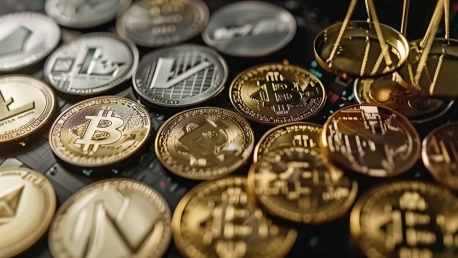In a landmark decision, the US Securities and Exchange Commission (SEC) reached a $4.5 billion settlement with Terraform Labs and its former CEO, Do Kwon. This settlement follows the catastrophic collapse of TerraUSD and Luna that sent shockwaves through the cryptocurrency market in 2022. The resolution of this high-profile case underscores growing regulatory scrutiny and sets a precedent for future actions in the volatile digital assets sector.
The Fallout of TerraUSD Collapse
The Collapse of TerraUSD and Luna
The Terra ecosystem revolved around TerraUSD (UST), a so-called stablecoin, and its companion token, Luna. In May 2022, UST lost its peg to the US dollar, leading to a rapid devaluation of both UST and Luna. This collapse resulted in significant financial losses for investors and raised questions about the stability and viability of algorithmic stablecoins.The dramatic downturn began when TerraUSD failed to maintain its fixed exchange rate to the US dollar, a critical feature that defines a stablecoin. This led to a cascading effect where panic selling ensued, driving the values of both UST and Luna into a tailspin. The mechanism that was supposed to balance the supply and demand of these tokens failed spectacularly, highlighting weaknesses in the algorithmic approach to maintaining a stable value. Investors found themselves caught in a financial whirlpool, losing billions of dollars collectively, and the market witnessed a significant loss of confidence in similar digital assets.
Impact on Investors and the Cryptocurrency Market
The implosion of TerraUSD had a ripple effect throughout the cryptocurrency market. Many investors, who believed in the stability of UST, faced substantial financial losses. The incident highlighted the inherent risks associated with investing in digital assets and sparked a broader conversation about the need for regulatory oversight in the cryptocurrency space.The collapse not only affected retail investors but also had implications for institutional stakeholders. Several investment funds and firms with exposure to Terra’s ecosystem suffered severe losses, triggering a widespread reevaluation of investment strategies in the crypto domain. The volatility associated with TerraUSD and Luna became a focal point for regulators worldwide, pushing them to consider stricter frameworks to prevent such occurrences in the future. This catastrophic event opened discussions on implementing robust due diligence processes and better risk management strategies among investors, fostering a more cautious approach to digital asset investments overall.
The SEC’s Investigation and Findings
Regulatory Scrutiny and Investigation
Following the collapse, the SEC launched a comprehensive investigation into Terraform Labs and Do Kwon. The regulator aimed to uncover whether Terraform Labs had violated securities laws through the issuance and sale of interlinked digital securities without proper registration. The findings revealed substantial evidence of civil fraud.During the investigation, the SEC scrutinized the promotional material, financial records, and internal communications of Terraform Labs. It emerged that Terraform Labs had portrayed TerraUSD and Luna as secure investments, misleading many about the inherent risks. The company’s failure to disclose critical information and its attempts to obscure the operational mechanisms of UST contributed to the SEC’s conclusions. These actions were deemed to have played a significant role in enabling the unsustainable growth of the Terra ecosystem, setting the stage for its eventual collapse. The investigation’s findings highlighted the importance of transparency and accountability in emerging financial technologies.
SEC’s Legal Actions
The SEC charged Terraform Labs and Do Kwon with civil fraud, emphasizing that the company misled investors about the stability and security of their products. The legal actions taken by the SEC were part of a broader initiative to safeguard investors and ensure the integrity of the financial markets.The commission’s charges included allegations that Terraform Labs conducted unregistered securities offerings and provided false statements to investors regarding the potential returns and stability of TerraUSD. By framing these digital assets as low-risk investments without adequate disclosures, the company violated federal securities laws. The legal actions also showcased the SEC’s intent to impose stringent penalties to deter other entities in the cryptocurrency space from engaging in similar misconduct. The resolution of these charges, through a hefty financial settlement and trading prohibitions, underscored the agency’s commitment to enforcing regulatory measures and protecting the interests of the investing public.
Details of the Settlement
Financial Penalties and Restrictions
The settlement approved by a US District Court judge includes $4.5 billion in disgorgement and civil penalties. Additionally, Terraform Labs and Do Kwon are permanently prohibited from trading crypto asset securities. This stringent restriction aims to prevent further harm to investors by barring them from engaging in similar activities in the future.The financial penalties comprise both disgorgement, which aims to strip the wrongdoers of their ill-gotten gains, and civil penalties designed to punish and deter future misconduct. This dual approach serves to ensure that Terraform Labs and Do Kwon cannot benefit from their past transgressions while also setting an example within the industry. The trading ban is particularly significant, as it halts their participation in any activities involving crypto asset securities, thereby mitigating risks for potential future investors. This decisive action underlines the severity with which regulatory bodies are now viewing compliance violations within the rapidly evolving digital asset sector.
Challenges in Enforcing the Settlement
Enforcing the financial penalties may present significant challenges. Terraform Labs is currently under Chapter 11 bankruptcy protection and holds assets worth approximately $150 million. The disparity between the company’s assets and the penalty amount raises questions about the feasibility of securing the full $4.5 billion.The bankruptcy proceedings add a layer of complexity to the settlement enforcement. Given the limited assets currently held by Terraform Labs, reclaiming the full penalty amount may prove to be a protracted legal and administrative challenge. Creditors and other stakeholders in the bankruptcy case will likely prioritize their claims on the company’s remaining assets, complicating the SEC’s efforts. Nonetheless, this situation exemplifies the broader consequences of regulatory violations and the financial precariousness that companies can face when held accountable. The enforcement difficulties also spotlight the critical role of regulatory preparedness and asset management in navigating potential legal repercussions.
Global Pursuit for Accountability
Do Kwon’s Legal Woes
Do Kwon’s legal troubles extend beyond the US. Currently detained in Montenegro, Kwon faces separate criminal charges in South Korea. The global nature of these legal proceedings underscores the international effort to hold individuals accountable for their roles in financial crimes that transcend borders.Kwon’s detention and the criminal charges he faces illustrate the cross-jurisdictional reach of financial regulations and the collective commitment of international regulators to punish malfeasance. The charges in South Korea primarily concern allegations of fraud and violations of financial laws, reflecting similar infractions identified by the SEC. The overlapping legal challenges signify a concerted effort to ensure that offenders cannot evade accountability by simply crossing borders. These actions send a powerful message to other figures in the cryptocurrency space about the global implications of engaging in deceptive and harmful financial practices.
Coordination Among International Regulators
The coordination between regulatory bodies in the US, South Korea, and Montenegro highlights the importance of international cooperation in tackling financial fraud in the digital asset space. This case serves as a reminder that the actions of key figures in the cryptocurrency industry can have far-reaching implications across multiple jurisdictions.The collaborative investigation and enforcement actions taken by these countries exemplify the growing recognition of the necessity for a unified regulatory approach. Such international cooperation helps to bridge regulatory gaps, making it harder for offenders to exploit discrepancies between national laws. By aligning their enforcement strategies, these regulatory bodies enhance the effectiveness of their individual efforts and contribute to establishing a more cohesive global financial regulatory environment. This cohesiveness is crucial in an era where digital assets transcend traditional borders, posing unique challenges to conventional regulatory practices.
Broader Implications for the Cryptocurrency Industry
Regulatory Precedents and Future Actions
The settlement sets an important precedent for future regulatory actions against cryptocurrency firms. It signals a clear message that regulators are committed to enforcing securities laws and protecting investors. The implications of this case are likely to influence how digital asset companies conduct their operations moving forward.The precedent lies in the severity of the penalties and the scope of the prohibitions imposed on Terraform Labs and Do Kwon. Other cryptocurrency firms are likely to scrutinize this case closely, prompting a reassessment of their compliance strategies and operational transparency. Companies may need to adopt more rigorous self-regulatory measures and improve their disclosures to safeguard against similar regulatory actions. Furthermore, the settlement may lead regulators to pursue more decisive and far-reaching actions against non-compliant entities, thus incrementally improving the regulatory landscape within the digital asset industry.
Market Reactions and Adaptations
The cryptocurrency market has taken note of the regulatory crackdown. In response, many firms are reevaluating their compliance frameworks to ensure they operate within the bounds of the law. This trend towards greater regulatory compliance could contribute to increased transparency and stability in the market, ultimately benefiting investors and fostering growth in the sector.Regulated exchanges and custodians are increasingly prioritizing compliance with anti-money laundering (AML) and know-your-customer (KYC) requirements. These changes aim to enhance investor protection and minimize the risks of fraud and market manipulation. Additionally, initiatives focused on educating investors about the inherent risks of digital assets are gaining traction, promoting a more informed and cautious approach to investing. This collective shift towards higher standards of compliance and investor education is likely to cement greater trust in the crypto market, paving the way for sustained, long-term growth.
Ensuring Market Integrity and Investor Protection
The Role of Regulatory Bodies
Regulatory bodies like the SEC play a crucial role in maintaining the integrity of financial markets. By holding entities accountable for their actions, regulators help build trust and confidence among investors. This case illustrates the proactive stance being taken to address issues in the burgeoning field of digital assets.The SEC’s actions serve as a fundamental safeguard against fraudulent activities and market misconduct. They provide a necessary check on the burgeoning digital asset market, ensuring its growth doesn’t come at the expense of investor security and market integrity. Effective enforcement of securities laws also helps level the playing field, enabling legitimate players to thrive without undue competition from rule-breakers. Such regulatory vigilance is critical for fostering a healthy, sustainable, and transparent marketplace that encourages innovation while safeguarding public interest.
Lessons Learned for Investors
In a landmark ruling, the US Securities and Exchange Commission (SEC) has finalized a $4.5 billion settlement with Terraform Labs and its former CEO, Do Kwon. This pivotal agreement comes in the wake of the devastating collapse of TerraUSD and Luna, events that rocked the cryptocurrency market in 2022. The failure of these digital assets sent tremors through the entire financial ecosystem, leading to massive investor losses and heightened concerns about the stability of the crypto market.The enormity of this settlement not only highlights the SEC’s growing regulatory oversight but also serves as a significant warning to other entities operating in the often-unpredictable world of digital currencies. This case has set a new benchmark, shaping the future landscape of regulatory actions aimed at ensuring accountability and transparency in the cryptocurrency sector.By addressing this high-profile case, the SEC aims to reinforce its commitment to protecting investors and maintaining market integrity. This decision signals a broader intent to hold companies and their leaders accountable for failures that adversely impact the market. Moving forward, this case will likely serve as a crucial reference point for regulatory bodies around the world as they navigate the complex and rapidly evolving domain of digital assets.









